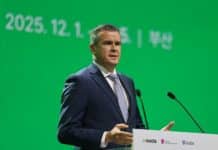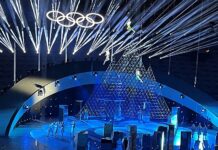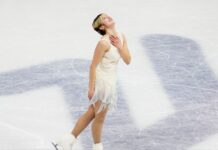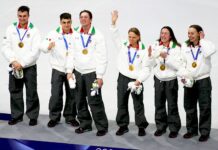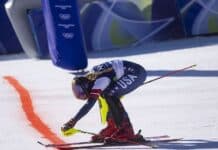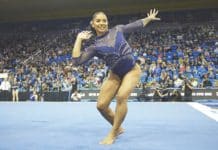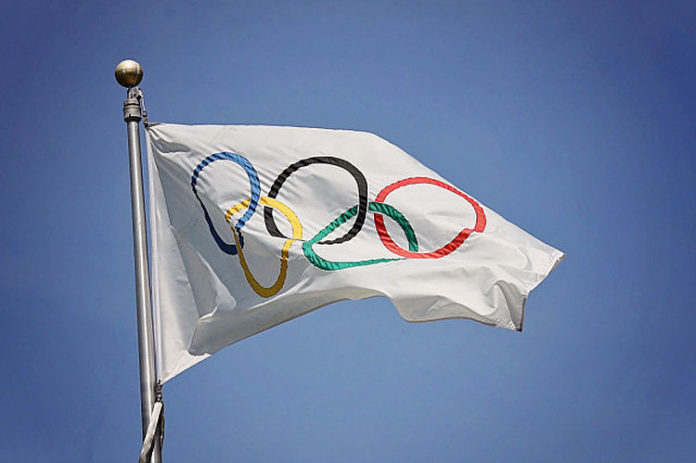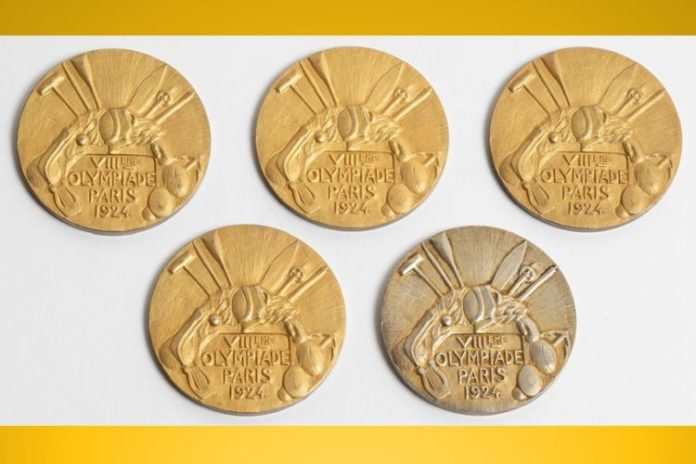★ The Sports Examiner: Chronicling the key competitive, economic and political forces shaping elite sport and the Olympic Movement.★
★ To get The Sports Examiner by e-mail: sign up here! ★
★ Everything helps! Thank you to 32 generous donors, who have covered 59.4% of our technical and support costs goal. Still 40.4% to go, so please consider a donation to help keep TSX going. It means a lot. ★
≡ THE 5-RING CIRCUS ≡
1. Court of Arbitration dismisses Russian suspension appeal
2. Football Australia reports says Women’s World Cup worth A$1.3 billion
3. IBU chief Dahlin now being investigated in Austria
4. Centennial Olympic Park ends major music fests
5. A win for transparency: FIVB details development funding
● The Court of Arbitration for Sport dismissed the appeal of the Russian Olympic Committee to the International Olympic Committee’s 2023 suspension for integrating Ukrainian sports organizations. The Russian reply called the decision “civil and sports discrimination.”
● Football Australia published a report showing an economic impact estimated at A$1.32 billion from its part of the 2023 FIFA Women’s World Cup, co-hosted with New Zealand. Most of the impact came from more than 86,000 foreign visitors who came for the tournament.
● The International Biathlon Union is being investigated by Austrian authorities over sales of media rights to the Austrian office of the Infront marketing agency by President Olle Dahlin. This after the Norwegian trial of former IBU chief Anders Besseberg just concluded; Dahlin categorically states that he did nothing wrong.
● Atlanta’s Centennial Olympic Park, a legacy of the 1996 Olympic Games, has ended mass music festivals because of the wear and tear they create, requiring too much down time for cleaning and rejuvenation of the turf. That means more time as a park.
● The International Volleyball Federation has unveiled an impressive, online display of all of its development projects from 2017 on, complete with project costs and details of what was delivered. This is the best presentation yet seen of federation development spending.
● World Championships: Bobsled & Skeleton (Three wins for Germany in first half of Worlds, but a shocker for Canada in Skeleton!) ●
● Panorama: Los Angeles 2028 (Dodger Stadium “gondola” receives first approval) = Milan Cortina 2026 (IOC Coordination Commission optimistic but vigilant on construction issues) = Alpine Skiing (2: Odermatt clinches seasonal World Cup; women’s races snowed out) = Athletics (3: men’s world 400 m record at SEC Championships; new world leaders by Duplantis and others; Charlton scares own women’s 60 m hurdles record in Madrid) = Cycling (4: Van Eetvelt wins UAE Tour with final-stage victory; Tratnik and Vos sprint to Omloop Nieuwsblad Elite wins in Ninove; Claessens and Sakakibara dominate Brisbane BMX stop; Roberts wins BMX Free Park in Enoshima as Japan sweeps Flatland titles) = Fencing (2: Italy and U.S. lead Cairo Foil World Cups; Japan’s Yamada takes Heidenheim Epee title) = Football (U.S., Brazil and Canada sweep into CONCACAF W Gold Cup quarters) = Freestyle Skiing (Phelan gets Canada’s eighth straight win in women’s Ski Cross) = Gymnastics (3: DiCello and Moldauer take Winter Cup All-Arounds; Davtyan, Kovtun, Tang and An score repeat wins in Cottbus World Cup; China takes three at Trampoline World Cup) = Luge (Germany wins five at first Sigulda World Cup) = Rugby Sevens (Argentina and New Zealand win in Vancouver) = Ski Jumping (2: Kraft wins 10th gold of season at Obertsdorf World Cup; Pinkelnig sweeps in Hinzenbach) = Ski Mountaineering (France wins four at Val Martello World Cup) = Snowboard (Austria wins two, Hofmeister and Tsubaki too at PGS Krynica) = Wrestling (U.S. sweeps titles at PanAm Champs, wins all 10 men’s Freestyle classes!) ●
1.
Court of Arbitration dismisses Russian suspension appeal
As expected, the Court of Arbitration for Sport tossed out the appeal by the Russian Olympic Committee of its suspension last October by the International Olympic Committee for incorporating regional sports organizations which had been part of the Ukrainian Olympic Committee:
“The CAS Panel in charge of this matter dismissed the appeal and confirmed the Challenged Decision, finding that the IOC EB did not breach the principles of legality, equality, predictability or proportionality.”
The decision is subject to appeal, on very limited grounds, to the Swiss Federal Tribunal, and the text of the decision is still confidential, but could be released later in whole or part.
The IOC, of course, was delighted:
“The IOC is pleased that the CAS confirmed the IOC Executive Board (EB) decision on 12 October 2023 to suspend the Russian Olympic Committee (ROC).
“The IOC EB decision followed the unilateral decision taken by the ROC on 5 October 2023 to include, as its members, the regional sports organisations which are under the authority of the National Olympic Committee (NOC) of Ukraine (namely Donetsk, Kherson, Luhansk and Zaporizhzhia), which constitutes a breach of the Olympic Charter because it violates the territorial integrity of the NOC of Ukraine, as recognised by the International Olympic Committee (IOC) in accordance with the Olympic Charter. The IOC EB decision has been duly implemented since it was taken.”
The Russian reply was predictably furious; the Russian Olympic Committee statement included:
“This CAS decision is another evidence that civil and sports discrimination directed against Russians has reached unprecedented proportions in the run-up to the Paris Games.
“Predictably, this case was considered in record time, unlike other claims of the Russian Olympic Committee, with which CAC has been ‘working’ for more than a year and a half. International sports arbitration has long lost its objectivity in relation to everything that concerns Russia, acting as a political tool, not an institution of justice.
“As for individual athletes who are still ready to accept humiliating criteria for possible participation in the Games, even in their regard, the IOC is making every effort to minimize the number of invitees. The introduction of new additional dropout parameters cannot be ruled out; Lausanne recently explicitly stated this. At the same time, agreeing even with the current requirements of ‘compliance’ may lead to a violation of Russian legislation.
“The relevant commissions and the ROC apparatus, carefully analyzing the current conditions, will take exhaustive measures to properly inform the all-Russian sports federations about the possible legal and other negative consequences of such consent.”
Russian Sports Minister Oleg Matytsin said on Sunday that the final decision on whether “neutral” athletes will be allowed to participate in Paris is still to come:
“The key will be respect for the interests of our athletes, coaches and compliance with the Olympic Charter. We have repeatedly said that the demands of some federations to sign a declaration are unacceptable for our athletes. We await the final decisions and recommendations of the IOC on the participation of our athletes. And we will make the appropriate decision together with the Russian Olympic Committee and the sports community.”
2.
Football Australia reports says Women’s World Cup worth A$1.3 billion
An 82-page report from Football Australia states that the 2023 FIFA Women’s World Cup provided a total economic impact of A$1.32 billion, or about $865.23 million (A$1 = $0.66 U.S.).
The findings cover only Australia and do not include New Zealand, the co-host of the tournament. The $1.32 billion economic impact projection was not broken down – fairly unusual in such reports – but included:
● 86,654 international visitors to Australia for the tournament
● 1,288,175 tickets sold for the 35 matches in Australia (99.92% of capacity)
● A$398.82 million in government spending on infrastructure
The report noted “the presence of 86,654 visitors in Australia being a major driver of the economic activity.”
Great attention was paid to the A$398.82 million in government funding, of which 93.59% went to facilities:
● A$171.09 million to high performance facilities (45.90% of the total)
● A$124.00 million to stadiums (31.09%)
● A$78.16 million to community facilities (19.60%)
So, the tournament itself and elite Australian teams received most of the government support, and the women’s Liberty A-League has seen substantial increases in interest and attendance following the Women’s World Cup, up to an average of 2,500 per month, almost double the pre-Women’s World Cup average.
At the school level, the Women’s World Cup provided a promotional platform which saw 19% more elementary schools offering football programs than in 2022.
The most astonishing claim in the study was A$324 million “Projected social value from reduced health costs based on Nielsen reported inspiration effect from the FIFA Women’s World Cup 2023.” And this is a measurement that will be continued as “Football Australia will continue to measure and monitor the impact of the tournament on participation in grassroots football and the long-term health and social impact of increased participation.”
The tournament itself had excellent support, with the organizing committee in Australia encompassing 1,902 staff and 4,270 volunteers.
3.
IBU chief Dahlin now being investigated in Austria
Just days after the conclusion of the Norwegian criminal trial of longtime International Biathlon Union President Anders Besseberg concluded, the Norwegian public television system NRK reported that current IBU chief Olle Dahlin (SWE) is being investigated in Austria.
Elected in 2018, Dahlin’s actions with regard to a sponsorship agency agreement with the Infront agency are being reviewed. Infront Sports & Media, headquartered in Switzerland, is a well known sports marketing agency and one of the issues in the Besseberg trial was whether the agreements he made with Infront shortchanged the IBU in terms of market value.
Dahlin is apparently being accused of the same, but objected to any accusation of wrongdoing:
“I am completely shocked by the accusations, which are completely unfounded, and I strongly refute them all. …
“I will not hesitate to take any legal steps necessary to maintain my good name and reputation. I have not received any formal notice of investigation at this stage, but am aware of the politically motivated speculation and insinuations.
“I have no doubt that the Austrian investigation will find that this is the case and will prove that I have acted correctly and ethically as president of the IBU.”
Former Infront head Volker Schmid (AUT) and other, current Infront staff members are apparently also being investigated by Austrian authorities.
The IBU itself issued a statement to NRK which included:
“The IBU is unable to comment on the investigation while it is ongoing. The IBU notes that the President vehemently denies wrongdoing of any kind. The Biathlon Integrity Unit (BIU), which represents the IBU as a potentially injured party in this case, is closely monitoring the situation, but to date has not seen any material evidence that could sustain unethical behavior by the IBU President.
“The IBU will continue to cooperate fully with the Austrian authorities in their investigation.”
4.
Centennial Olympic Park ends major music fests
Just too damaging. That’s the verdict on the massive music festivals which have packed the 22-acre Centennial Olympic Park in Atlanta – a legacy of the 1996 Olympic Games – over the past decade, and which will no longer be held there.
The Georgia World Congress Center Authority runs the park, along with an increasing number of surrounding facilities and confirmed the permanent policy change last week. Said GWCCA Chief Administrative Officer Jennifer LeMaster:
“The park is considered the front door of the convention center. It’s the entrance to the hospitality district and, in my opinion, the focal point of downtown Atlanta. …
“The question is: How often should the park function as an event venue rather than a park? It’s an art, not a science.”
LeMaster explained that music festivals such as Shaky Knees, Sweetwater 420 and One MusicFest draw tens of thousands and the park feels it. As many as 10 mass events were held annually, but by 2020, it was too much. The damage to the grass areas not only required re-seeding, but closing the park until it recovered. LeMaster observed:
“It became a question of access. And there was too much wear and tear.”
She also noted that the environment around the park has changed dramatically, with the College Football Hall of Fame, Georgia Aquarium, Mercedes-Benz Stadium, the National Center for Civil and Human Rights, World of Coca-Cola and the SkyView Atlanta Ferris wheel all close by. All of this meant keeping the park open and available became more and more important.
Now a central feature of downtown Atlanta, the park was built by the Atlanta Committee for the Olympic Games as a focus point for the 1996 Games and was, sadly, the site of a bombing on 27 July 1996 that killed two and injured 111, planted by domestic terrorist Eric Rudolph, eventually caught, convicted and now serving a life sentence.
5.
A win for transparency: FIVB details development funding
International Federations are thrilled to send announcements on the millions of dollars, euros, francs and other currencies spent on development activities worldwide. None actually provided any deep detail on exactly who got what.
Until now.
The International Volleyball Federation (FIVB) launched an impressive, publicly-available database and index tool which details their spending on coaching, equipment and knowledge transfer programming for its 194 member federations since 2017.
Each member federation is listed and once you click on it, the “FIVB Volleyball Empowerment Projects Dashboard” shows the total amount of funding (in Swiss Francs) and the number of projects. A list of each project is shown on a central table and at the right is a chart showing a bar graph of the amount of funding for equipment (blue), coaching support (green) and knowledge transfer (purple).
So, for Afghanistan, the first country shown, it received:
● CHF 75,000 for equipment: 200 volleyballs and a 693 sq. m performance floor
● CHF 42,000 for coaching grants in 2022 and 2023
● CHF 117,000 total for 6 projects
Poland, with one of the strongest programs in the world and a country which has an intense interest in the sport, received nothing. Same for the U.S. Same for Russia. South Africa has been supported with 10 projects:
● CHF 82,000 for equipment: volleyball, a floor and net systems
● CHF 126,000 for coaching grants in 2022
● CHF 15,000 for coaching, refereeing and sports management development
There is an “enhanced” display which breaks down funding by type:
● CHF 19,000,000 for coaching support: 372 grants to 155 countries
● CHF 6,000,000 for balls and nets: 444 grants to 146 countries
● CHF 4,000,000 for floors: 87 grants to 69 countries (with a map!)
● CHF 528,000 for knowledge transfer programs: 103 grants to 60 countries
And there is a global map, showing 308 projects to African members, 217 in Europe, 215 in Asia, 110 in North and Central America and the Caribbean and 69 in South America.
Assuming the data is accurate – there is no certification from an outside auditor – this is a spectacular advance in demonstrating a federation’s development activities over time, in an easy-to-query and highly detailed format.
There is a companion Serving Volleyball: Return on Investment publication which is a summary of the dashboard data, but is far less impressive than the online database.
Observed: This is the best, most easily accessible and understandable presentation of development funding data available for any International Federation and is a real step forward. In the simplest terms, every federation which can afford to do this – many can’t – should adopt a similar presentation.
At the same time, while the FIVB should be congratulated on this effort as an exercise in transparency, it can improve in other areas of governance, such as making its annual financial statements available under a clear heading on its Web site, instead of being buried in its Congress reports.
But, one advance at a time.
≡ WORLD CHAMPIONSHIPS ≡
● Bobsled & Skeleton ● The IBSF World Championships began in Winterberg (GER), with Skeleton races and the Two-Man and women’s Monobob.
Even though double Olympic champ Francesco Friedrich (GER) hadn’t won a Two-Man World Cup race this season, it did not stop him and Alexander Schueller from winning the Worlds gold in 3:38.27, ahead of emerging stars Adam Ammour and Issam Ammour (GER: 3:38.61) and defending champs Johannes Lochner and Georg Fleischhauser (GER: 3:38.74). It’s Friedrich’s eighth world title in the past nine years, the last two with Schueller.
Americans Frank Del Duca and Manteo Mitchell were fifth in 3:40.24.
The women’s Monobob was a repeat win for Germany’s Laura Nolte, who edged American star Elana Meyers Taylor, 3:54.77 to 3:54.95, with Lisa Buckwitz (GER: 3:55.00) winning her second straight Worlds bronze. It’s Meyers Taylor’s first Worlds Monobob medal; she was also the Beijing 2022 Olympic runner-up. Fellow Americans Kaysha Love (3:55.36) and Sylvia Hoffman (3:55.53) finished 6-7.
The Four-Man and Two-Woman races will be held next week.
In Skeleton, the winners of the last three men’s Worlds faced off and Christopher Grotheer (GER) took his third title in the last four seasons in 3:44.91 over four runs to 3:45.14 for defending champ Matt Weston (GBR). Grotheer ranked 1-4-1-2 in his runs, with Zheng Yin (CHN: 3:45.92) third and Marcus Wyatt (GBR: 3:45.93) fourth. Austin Florian was the top American, in ninth (3:46.57).
The women’s race was a shocker, with World Junior Champion Hallie Clark of Canada, 19, taking the gold in 3:51.27, placing 2-10-2-1 in her four runs to best European champ Kim Meylemans (BEL: 3:51.49) and 2022 Beijing Olympic champ Hannah Niese (GER: 3:51.53) was third. American Mystique Ro, a three-time World Cup medalist this season, was eighth (3:51.65). Clark ended a streak of six straight German Worlds golds in this event.
Grotheer and Niese combined to win the Mixed Relay in 1:59.09, the fourth straight German win in the event. Britain, with Tabitha Stoecker and Weston (1:59.21) took silver and the second German team of Jacqueline Pfeifer and Axel Jungk got the bronze (1:59.31). The U.S. team of Ro and Florian was fifth (1:59.55).
≡ PANORAMA ≡
● Olympic Games 2028: Los Angeles ● The downtown Los Angeles gondola transit project from Union Station to Dodger Stadium received a first-stage approval from the Los Angeles Metropolitan Transit Authority by an 11-0 vote on Thursday, with one abstention.
The approval was contingent on the project meeting 31 conditions, which included:
“If the Project is non-operational or experiences issues during the 2028 Games, ZET [the operator] will compensate Metro for any and all transportation costs that the Agency would not have incurred but for LAART’s non-operation or issues”
Multiple additional approvals will be required, but the privately-funded project is proceeding.
● Olympic Winter Games 2026: Milan Cortina ● The IOC Coordination Commission concluded its latest visit to evaluate the progress of the organizing committee as 2026 draws closer. No alarms were sounded, although the concerns over the building of the sliding track in Cortina are still top of mind:
“The Commission reiterated the IOC’s concerns about the delivery of this project within the required timeline, underlining that the primary focus is on athlete safety. Challenges regarding the viability of the sliding track’s legacy also remain, while the request for the development of a plan B was also emphasised.”
And construction issues were also underscored on two other sites:
“In addition, new resources will also closely monitor the construction progress in Livigno Snow Park [for Freestyle and Snowboard], Predazzo and Cortina Villages and Palaitalia Santa Giulia for ice hockey. All these projects are facing very challenging timelines and cannot be delayed.”
One positive from the visit was the confirmation that multiple events will be managed by the same groups which already stage respected World Cup competitions, “They include the Cortina Foundation, the Antholz/Anterselva Biathlon World Cup Committee, the Val di Fiemme Nordic Ski Committee and the Bormio Foundation.”
An issue which was not included in the IOC’s report was excessive worry over the domestic sponsorship program, which has accelerated under chief executive Andrea Varnier, appointed in late 2022. That’s good.
● Alpine Skiing ● Swiss star Marco Odermatt enjoyed the Giant Slalom at the FIS Alpine World Cup in Palisades Tahoe (USA), not only winning in 2:11.69, but clinching his third straight overall World Cup title!
Odermatt, 26, led after the first run by 0.15 over Norway’s Henrik Kristoffersen and maintained it, although Kristoffersen was slightly faster on the second run and closed to 0.12 behind: 2:11.69 to 2:11.81. American River Radamus was third after the first run and held on to get the bronze, for his first career World Cup medal!
Odermatt wrapped up the seasonal title with 10 races to go, with 1,702 points to 701 for Austria’s Manuel Feller, as other challengers were lost to injuries this season.
Sunday’s second Giant Slalom was the fourth win of the season for Slalom points leader Feller, who was third-fastest on the first run and only 17th-fastest on the second, but that was good enough for a 1:42.08 total and the win. France’s 2022 Olympic Slalom champ Clement Noel was second on the first run, then 21st to finish at 1:42.36 for second and first-run leader Linus Strasser (GER: 1:42.46) ended up third. Jett Seymour was the top American, in 15th (1:43.61).
¶
Both of the women’s World Cup Super-G races at Val di Fassa (ITA) was canceled due to heavy weather.
● Athletics ● An indoor world record in the men’s 400 m for Canada’s Christopher Morales Williams at the SEC Indoor Championships in Fayetteville, Arkansas on Saturday in 44.49.
Running for Georgia, Morales Williams finished well ahead of Jamaica’s Jevaughn Powell of Florida (45.61). The time of 44.49 breaks a venerable indoor record of 44.57 by Kerron Clement of the U.S. from 2005, as well as the 44.52 mark by American Michael Norman from 2018, which was not ratified.
¶
More world leaders over the weekend, starting with Mondo Duplantis (SWE) taking the men’s vault lead at 6.02 m (19-9) at the All-Star Perche in Clermont-Ferrand (FRA) last Thursday.
France’s Thibaut Collet was second to Duplantis with a lifetime best of 5.92 m (19-5), finishing ahead of Sam Kendricks of the U.S. on the countback.
On Saturday, Molly Caudery (GBR) cleared 4.86 m (15-11 1/4) for the women’s lead in Rouen (FRA), beating Finland’s Wilma Murto and American Bridget Williams, both at 4.80 m (15-9). In the men’s vault, Kendricks won at 5.93 m (19-5 1/2) over fellow American Chris Nilsen (5.93 m/19-1 1/2).
At the Big 12 Championships in Lubbock, Texas, Terrence Jones Jr. (BAH) of Texas Tech tied the world lead at 20.21, already achieved by American Erriyon Knighton.
¶
Hurdles star Devynne Charlton (BAH) kept the heat on at the final World Indoor Tour Gold meet of the season in Madrid (ESP) on Friday, winning the women’s 60 m hurdles in 7.68, just 0.01 off her 7.67 mark from the Millrose Games on 11 February.
It’s the equal-third performance of all-time, and Charlton now heads to the World Athletics Indoor Championships in Glasgow (GBR) next week.
Italy’s Catalin Tecuceanu won the men’s 800 m from the front in a world-leading 1:45.00, a national indoor record, ahead of Spain’s Mohamed Attaoui (1:45.67) and Adrian Ben (1:45.72).
Spain’s Jordan Alejandro Diaz won the men’s triple jump at 17.52 m (57-5 3/4) to move to no. 2 on the 2024 world list and Jamaican shot star Rajindra Campbell won over New Zealand’s two-time World Indoor champ Tom Walsh, 22.16 m (72-8 1/2) to 22.03 m (72-3 1/2).
Jamaica’s Lamara Distin (Texas A&M) became the second to jump 2.00 m (6-6 3/4) indoors this season with her win at the SEC meet in Arkansas.
● Cycling ● The third race on the 2024 UCI men’s World Tour was the seven-stage UAE Tour, concluded Sunday with a final-stage win for Lennart van Eetvelt (BEL).
Australia’s Jay Vine led from stages three through six after back-to-back second-place finishes in the second and third stages propelled him to the front. But after stage six, 13 riders were within a minute of Vine, with the final day’s 161 km ride finishing uphill. That turned out to be the difference, as van Eetvelt attacked with 1.8 km left and no one could follow. He won in 3:38:28, 22 seconds ahead of the field and 4:12 up on Vine, who finished 32nd.
That gave van Eetvelt, 22, a two-second win over Ben O’Connor (AUS) and 11 seconds over Pello Bilbao (ESP). It’s the Belgian’s first World Tour stage win and first World Tour overall win.
Van Eetvelt gave Belgium a sweep of the UAE Tours for men and women, as 2023 World Road Champion Lotte Kopecky took the women’s race (8-11 February) from Neve Bradbury (AUS: +0:13) and Mavi Garcia (ESP: +0:44).
¶
At the 79th Omloop Nieuwsblad Elite race, a modestly hilly 202.2 km route from Ghent to Ninove (BEL), the decision came down to a final sprint between Jan Tratnik (SLO) and German Nils Politt, with Tratnik, 34, claiming his first individual UCI World Tour win in 4:31:28.
Politt was three seconds back, after breaking away with 9 km left. They were followed by 32 others eight seconds back, led by Belgian stars Wout van Aert – the 2022 winner – and Oliver Naesen.
The women’s race – the 16th edition – also from Ghent to Ninove – but 127.1 km – was a four-way duel over the last 10 km and the sprint to the line was won by 36-year-old Dutch superstar Marianne Vos in 3:27:15. Amazingly, among her 39 Women’s World Tour victories, this was her first in this race, and her first medal!
Vos got to the finish ahead of Belgian Kopecky, who won the prior Women’s World Tour race (UAE Tour), and Elisa Longo Borghini (ITA) and Shirin van Anrooij (NED).
¶
The second pair of BMX World Cup races was in Brisbane (AUS), with home favorite Izaac Kennedy taking Saturday’s final in 34.423, ahead of Ross Cullen (GBR: 34.793) and American Jeremy Smith (36.047).
Tokyo 2020 silver winner Kye Whyte (GBR) won on Sunday in 33.941, just ahead of Swiss Cedric Butti (34.001) and Carlos Ramirez (COL: 34.496).
Swiss Zoe Claessens, the 2022 Worlds silver medalist, won the Saturday women’s final, spoiling the fan hopes for home favorite Saya Sakakibara (AUS: 37.069), with Manon Veenstra (NED: 38.326) in third. And Claessens and Sakakibara went 1-2 on Sunday, in 36.860 and 37.440, with the U.S.’s two-time World Champion Alise Willoughby in third (38.191).
¶
At the BMX Freestyle World Cup in Enoshima (JPN), three-time European Champion Anthony Jeanjean (FRA) won the men’s Park final over Tokyo Olympic champ Logan Martin (AUS) and 2019 Worlds bronze winner Nick Bruce of the U.S.
American star Hannah Roberts, the five-time World Champion, won the women’s final, ahead of Chile’s Macarena Perez and China’s Yawen Deng.
The BMX Flatland men’s final saw 19-year-old Yu Katagiri (JPN) win over 38-year-old Jean William Prevost (CAN) and Yu Shoji (JPN). Japan took the top six places in the women’s Flatland final, led by 16-year-old Nina Suzuki, then Ayuna Miyashima (16) and Yui Kiyomune (15) on the podium.
● Fencing ● Both the men’s and women’s Foil stars were in FIE World Cup action in Cairo (EGY), with four medals all together for the U.S.
Olympic champ Lee Kiefer continued her hot streak, reaching the final but losing, 15-13, to Martina Favaretto of Italy, who defended her Cairo win in 2023. Kiefer had to face fellow American Jacqueline Dubrovich in the semis, winning by 15-13; it’s Dubrovich’s second career World Cup medal and first since 2021. In Kiefer’s four tournaments this season, she’s finished 2-5-1-2 and retained her world no. 1 ranking.
Kiefer and Dubrovich led the U.S. to the team title, with a 45-33 finals win over Italy, with help from Lauren Scruggs and Maia Mei Weintraub.
The all-Italian final in the men’s competition saw 2023 World Champion Tommaso Marini slide past Eduardo Luperi, 15-6, in the final. It’s Marini’s fourth career World Cup gold.
The men’s team title was won by Italy, 45-30, over Japan, after the Italians managed a 45-31 won over the U.S. bronze-medal squad of Miles Chamley-Watson, Nick Itkin, Alexander Massialas and Gerek Meinhardt in the semifinals.
¶
At the men’s Epee World Cup in Heidenheim (GER), 45th-ranked Masaru Yamada of Japan won his first World Cup gold with a 15-9 finals victory over 164th-ranked Enrico Piatti (ITA), 21, who won his first World Cup medal of any color!
● Football ● At the inaugural CONCACAF W Gold Cup, the U.S. and Brazil qualified for the quarterfinals on Friday and Saturday by winning their second straight games.
The U.S. had little trouble with Argentina in Friday’s match in Carson, California, winning 4-0 off two goals from emerging star Jaedyn Shaw in the 10th and 18th minutes, followed by an Alex Morgan score in the 19th for a 3-0 halftime lead. Lindsey Horan scored on a penalty kick in the 77th for the final; the U.S. had a 23-2 edge on shots. The final group game for the Americans comes Monday against Mexico.
Brazil won its two games in Group B by 1-0, against Puerto Rico (a Gabi Nunes goal) and Colombia (Duda Santos), playing in San Diego. The Brazilians will face Panama on Tuesday.
In Group C, Canada defeated El Salvador, 6-0, in Houston on Thursday and then stomped Paraguay on Sunday, 4-0, thanks to a hat trick from Adriana Leon in the 25th, 49th and 57th minutes. They will finish against Costa Rica on Wednesday.
● Freestyle Skiing ● The Ski Cross World Cup in Reiteralm (AUT) had a lot of snow on Saturday, canceling the women’s race, but two-time Worlds bronze winner Erik Mobaerg got his second win of the season in the men’s race, ahead of Jonas Lenherr (SUI) and first-time World Cup medalist Melvin Tchiknavorian (FRA).
On Sunday, France’s Youri Duplessis Kergomard, 27, got his first career World Cup gold by beating 2023 World Champion Simone Deromedis (ITA) in the final, while Tchiknavorian won his second World Cup medal in two days with the bronze.
Brittany Phelan, the 2018 Olympic runner-up, made it eight straight wins on the season for Canada in the women’s final, winning over Marielle Berger Sabbatel (FRA), who earned her ninth medal of the season and sixth silver (0-6-3)! The bronze was a rare tie between Swiss riders Talina Gantenbein and Margaux Dumont.
● Gymnastics ● At the much-anticipated USA Gymnastics Winter Cup in Louisville, Kentucky, World Team Champion and 2021 Worlds All-Around bronze winner Kayla DiCello, 20, took the women’s All-Around title at 56.850, ahead of two-time Team Worlds gold medalist Skye Blakely (54.650).
Hezly Rivera (54.000) took third, with Florida’s 2022 NCAA A-A champ Trinity Thomas fourth in 53.250. Olympic All-Around champ Suni Lee contested only the Uneven Bars (11.800, two falls) and Beam (12.900, one fall). Gabby Douglas, 28, the London 2012 All-Around gold medalist, was scheduled to compete but fell ill and withdrew.
In the men’s two-day All-Around, Tokyo Olympians Shane Wiskus and Yul Moldauer battled it out, with Wiskus leading after Saturday’s routines, 84.850 to 84.450. But Moldauer outscored Wiskus on five of six apparatus on Sunday and won the event at 169.750 to 167.450. Riley Loos (164.400) was third, followed by Cameron Bock (163.850) and Fuzzy Benas (163.600).
¶
The second of four rounds in the FIG Apparatus World Cup was in Cottbus (GER), with a first-day upset as Britain’s Harry Hepworth (14.900) scored a tight win over World All-Around gold medalist Artem Dolgopyat (ISR: 14.866). Sung-hyun Ryu (KOR: 14.366 took third).
Nariman Kurbanov (KAZ: 15.433) won the Pommel Horse over Ahmad Abu Al Soud (JOR: 15.300) and Woong Hur (KOR: 15.300) and on Rings, Nikita Simonov (AZE: 14.700) won a tight battle with Samir Ait Said (FRA: 14.666) and Vahagn Davtyan (ARM: 14.600)
On Sunday, Armenia’s Artur Davtyan won for the second straight week on Vault (15.050) over Mahdi Olfati (IRI: 14.900) and Ukraine’s two-time Worlds All-Around medalist Ilia Kovtun (15.266) and Rio 2016 Olympic champ Oleg Verniaiev (15.166) repeated their 1-2 from Cairo on the Parallel Bars. American Khoi Young finished sixth (14.133). On the Horizontal Bar, Chia-hung Tang (TPE: 14.600) also repeated from Cairo, winning on a tie-breaker with Hao Tian (CHN: 14.600).
The women’s Vault went to North Korea’s Chang-ok An (13.999)– her second straight World Cup win – well ahead of Valentina Georgieva (BUL: 13.399) and Karla Navas (CHI: 13.383). Algeria’s Worlds runner-up Kaylia Nemour starred on the Uneven Bars, scoring 15.433 to win easily from Alena Tsitavets (BLR: 14.100) and Maellyse Brassart (BEL: 13.700).
China’s Yaqin Zhou, the 2023 Worlds runner-up on Beam, won that event at 14.900, ahead of Japan’s Urara Ashikawa (14.200) and Haruka Nakamura (14.000). Zhou then took top honors on Floor (13.733), ahead of teammate Xinyi Chen (13.666).
¶
At the FIG Trampoline World Cup season opener in Baku (AZE), 2023 Worlds silver winner Zisai Wang (CHN) defeated teammate and two-time World Champion Langyu Yan in the men’s final, 62.160 to 61.990, with Tokyo Olympic champ Ivan Litvinovich (BLR: third (60.440).
Tokyo Olympic champ Xueying Zhu won the women’s final at 56.920, beating Russians Anzhela Bladtceva (56.590) and Iana Lebedeva, the 2021 Worlds bronze medalist (56.080).
China (51.090) won the men’s Synchro title over Kazakhstan (50.520) and the U.S. (Ryan MacCagnan and Isaac Rowley: 50.470), while the U.S. duo of Nichole Ahsinger and Cheyenne Webster won the women’s Synchro gold, scoring 49.010 to 48.850 for China.
● Luge ● The penultimate FIL World Cup of the 2023-24 season was in Sigulda (LAT), with Germany’s 2010 and 2014 men’s Singles winner Felix Loch, now 34, scoring two wins.
He took the men’s Singles title at 1:35.650, edging Latvia’s World bronze winner Kristers Aparjods (1:35.709) with World Champion Max Langenhan (GER: 1:35.962) third. Jonny Gustafson was the top American, in 12th (1:37.002). Loch then took the Sprint title in 27.223, over Aparjods (27.290) and Austria’s 2018 Olympic champ David Gleischer (27.325).
Latvia’s Martins Bots and Roberts Plume – the Doubles Sprint World Champions – won their first Doubles race of the season in 1:23.308, ahead of triple Olympic champs Tobias Wendl and Tobias Arlt (GER: 1:23.326) and Worlds runner-ups Thomas Steu and Wolfgang Kindl (AUT: 1:23.582). Zachary Di Gregorio and Sean Hollander of the U.S. got sixth (1:23.836) and Dana Kellogg and Frank Ike were eighth (1:24.078).
Bots and Plume completed their double by winning the Sprint (30.714), ahead of Wendl and Arlt (30.801) and Emanuel Rieder and Simon Kainzwalder (ITA: 30.843); Di Gregorio and Hollander finished sixth (30.907).
Germany’s Anna Berreiter, the 2023 World Champion, got her first victory of this World Cup season in the women’s Singles, in 1:23.405, coming from seventh after the first run. Elina Vitola of Latvia grabbed her second silver of the season (1:23.423) and 2021 World Champion Julia Taubitz was third (1:23.486). American Ashley Farquharson got fourth (1:23.521) and Emily Sweeney was 12th (1:23.743).
Taubitz won the women’s Sprint (30.652) over Kendija Aparjode (LAT: 30.760) with Sweeney third (30.858) and Farguharson eighth (30.946).
Jessica Degenhardt and Cheyenne Rosenthal got their fourth win of the season in the women’s Doubles in 1:25.743, just ahead of Worlds Sprint winners Andrea Voetter and Marion Oberhofer (ITA: 1:25.828) and Dajana Eitberger and Saskia Schirmer (GER: 1:25.851). Chevonne Forgan and Sophia Kirkby of the U.S. finished fifth (1:26.135).
Voetter and Oberhofer took the women’s Sprint in 31.187, beating Selina Egle and Lara Kipp (AUT: 31.261) and Eitberger and Schirmer (31.335). For the U.S., Forgan and Kirkby were fifth (31.485).
● Rugby Sevens ● The fourth stage of the season for men and women was in Vancouver (CAN), with Argentina continuing its rampage through the men’s division with its third win.
Two teams – Argentina and France – swept all three pool matches and sailed into the semifinals, where New Zealand edged the French, 28-26, while Argentina disposed of the U.S. by 35-19. In the final, it was 36-12 for Argentina for its third straight tournament win, and France took the bronze with a 42-12 win against the U.S.
Argentina sits at 78 points, way ahead of Ireland and Fiji, both at 54.
The women’s pool matches saw Australia, France and New Zealand undefeated and they all advanced to the semis, with the French winning by 21-19 against Australia and New Zealand out-fighting Canada, 15-7. In the final, it was 35-19 for New Zealand for their first win this season after second, third and fifth-place finishes. Canada won the third-place game, 35-19, over France.
Australia still leads the seasonal standings at 72 points, with New Zealand at 66 and France at 62; the U.S. is fourth at 48.
● Ski Jumping ● The men’s World Cup moved to the giant, 235 m ski-flying hill in Obertsdorf (GER), with two-time Olympic medalist Timi Zajc leading a Slovenian 1-2 with Peter Prevc, 449.3 to 445.1. Seasonal leader (and three-time World Champion) Stefan Kraft (AUT) got third at 440.3.
On Sunday, Kraft won for the 10th time this season, scoring 433.5 to best Prevc (430.2) and Japan’s Ryoyu Kobayashi (422.1). With 10 events left this season, Kraft has a 1,546 to 1,277 lead on Kobayashi.
¶
The women’s World Cup circuit was in Hinzenbach (AUT) for two events off the 90 m hill, with home favorites Eva Pinkelnig and Jacqueline Seifriedsberger going 1-2 at 243.1 and 240.2. It’s the fourth win of the season for Pinkelnig, the 2023 Worlds runner-up. Germany’s two-time Olympic silver winner Katharina Schmid took the bronze in 238.0.
Sunday was a repeat win for Pinkelnig (246.6) over Slovenian teen (and seasonal leader) Nika Prevc (238.9) – 18, the younger sister of Peter and Domen Prevc – with Seifriedberger third again (237.8).
With eight events to go, Prevc leads Pinkelnig in the seasonal standings, 1,079 to 871.
● Ski Mountaineering ● At the ISMF World Cup in Val Martello (ITA), France scored a 1-2 with Xavier Gachet and three-time World Cup seasonal champion William Bon Mardion in the 14.26 km Individual Race, 1:23:59.94 to 1:24:04.49, with two-time World Cup champ Matteo Eydallin (ITA: 1:24:05.16) third.
Axelle Gachet Mollaret (FRA) – married to Xavier Gachet – and a triple gold medalist at the 2023 Worlds, won the women’s race in 1:27:24.04, with Worlds silver winner Alba de Silvestro (ITA: 1:28:04.37) following in second and Johanna Hiemer (AUT: 1:29:09.92) in third.
The French swept the Sprints as well, with Robin Galindo winning the men’s race (and his first World Cup gold) in 3:18.47 to 3:18.71 for Spain’s Oriol Cardona Coll, and Emily Harrop and Celia Perillat-Pessey going 1-2 in 3:47.44 and 3:50.94. It’s Harrop’s seventh World Cup win this season!
Italy took the Mixed Relay, however, with Michele Boscacci and de Silvestro, ahead of Austria, 38:17.46 to 38:40.08.
● Snowboard ● Austria’s three-time Worlds gold medalist Andreas Prommegger took the first Parallel Giant Slalom race at the FIS World Cup PGS in Krynica (POL) ahead of 43-year old Roland Fischnaller (ITA) in the final, who won his second medal of the season, with Daniele Bagozza (ITA) winning the bronze.
On Sunday, Austria’s Arvid Auner won his second career World Cup gold in the final over Maurizio Bormolini (ITA), while Alexander Payer (AUT) took the bronze.
Germany’s 2018 Olympic bronze winner Ramona Theresia Hofmeister took the women’s Saturday final for her fourth win of the season over two-time Worlds winner Julie Zogg (SUI). Dutch rider Michelle Dekker got the bronze.
World Champion Miki Tsubaki (JPN) got her second win and fifth medal of the season in Sunday’s final, defeating Daniela Ulbing, the Beijing 2022 runner-up. Swiss Ladina Jenny, the 2023 Worlds runner-up, got third over Hofmeister.
● Wrestling ● The U.S. teams swept all three team titles at the Pan American Championships in Acapulco (MEX), with the men winning all 10 weight classes!
The U.S. men scored a perfect 250 points to 98 for Canada, with golds for Spencer Lee (57 kg), Nick Suriano (61 kg), Nick Lee (65 kg), Alex Pantaleo (70 kg), Kyle Dake (74 kg, his fourth PanAm title), Alex Facundo (79 kg), Chance Marsteller (86 kg), Nate Jackson (92 kg), Rio Olympic champ Kyle Snyder (97) and Mason Perris (125 kg).
American women dominated with 205 points to 140 for Canada and won medals in all 10 classes, with golds for Alisha Howk (55 kg), Rio Olympic 53 kg champ Helen Maroulis (57 kg). Kayla Miracle (62 kg), Macey Kilty (65 kg) and Brooklyn Hays (72 kg). The U.S. added one silver and three bronzes.
The U.S. won the Greco-Roman division for the sixth time in a row, with 183 points to 125 for Mexico. In the final two classes, Alan Vera won a silver at 97 kg and Noah Wachsmuth took the 72 kg bronze.
Next up is the Pan American Olympic Qualifier, also in Acapulco, next week.
¶
You can receive our exclusive TSX Report by e-mail by clicking here. You can also refer a friend by clicking here, and can donate here to keep this site going.
For our new, 920-event International Sports Calendar for 2024 and beyond, by date and by sport, click here!










